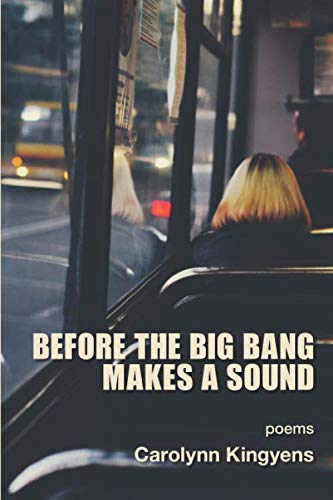Book Review: “Before the Big Bang Makes a Sound” — Poetry of Common Cause
By Ed Meek
Carolynn Kingyens’s debut book of poems, Before the Big Bang Makes a Sound, reminds us of our everyday struggles.
Before the Big Bang Makes a Sound by Carolynn Kingyens. Kelsay Books.
 It is hard to ignore the growing disparity between the rich and everyone else, as well as the allegedly nonexistent class system we’ve all grown up in (see Parasite). But a number of works have come along recently to remind us of our common struggles: Big Little Lies, Curb Your Enthusiasm, Marriage Story, Sanditon, The Slave Play, among them. Carolynn Kingyens’s debut book of poems, Before the Big Bang Makes a Sound, makes those kind of empathic connections, exploring the world from the point of view of a married, middle-class mother of two. She, like many of us, encounters illness, questions faith, is concerned with gender roles and sexism and the way class plays into these issues.
It is hard to ignore the growing disparity between the rich and everyone else, as well as the allegedly nonexistent class system we’ve all grown up in (see Parasite). But a number of works have come along recently to remind us of our common struggles: Big Little Lies, Curb Your Enthusiasm, Marriage Story, Sanditon, The Slave Play, among them. Carolynn Kingyens’s debut book of poems, Before the Big Bang Makes a Sound, makes those kind of empathic connections, exploring the world from the point of view of a married, middle-class mother of two. She, like many of us, encounters illness, questions faith, is concerned with gender roles and sexism and the way class plays into these issues.
Don’t let the title fool you into thinking these are poems about Stephen Hawking’s universe. The title comes from a poem called “High Anxiety.” Who among us isn’t anxious today? If you live in a city you are probably not too far away from a “dive bar, / an F-bomb away / from spontaneous / combustion… where “a thumb hovers / over an invisible trigger, / before the big bang / makes a sound.” There are a number of effective poems like this one that examine how class struggle overlaps with sexism.
Kingyens grew up one of seven children in North Philadelphia and, even though she now lives in Manhattan and drives an Audi Q5, she has not moved far from her working-class roots. In “No one is Immune”
…a house built on shot
glasses, pill bottles
and ash trays will age
a body strangely—
broken biology,
Freakonomics,
the way a fresh face
can turn into a catch-all
mitt, weathered before
its time; the way a delicate
voice can turn into the bark
of a seal, while the body,
from the neck down,
remains preserved
much longer.
She’s describing the people outside the mainstream, marginalized by neoliberalism. No one is immune to aging, yet it is women who feel the effects the most severely in a culture that puts a premium on female youth and appearance. In “Break the Mirror in Your Youth,” she says:
The beauty of babes
Is currency.
But beauty has less
of a shelf life
than vegetable oil
or MSG…
Today, a stale cookie
shaped like a deformed
pilgrim collar tells me:
Break the mirror
In your youth.
Here Kingyens transforms, with surprising economy, everyday materials and objects in our lives. The fortune lodged in the fortune cookie was probably referring to luck, but Kingyens turns the meaning into a critique of our selfie culture and its obsession with female beauty.
In “Small as a Mouse” she writes about women’s tendency to always be apologizing. In “The Weight of Words” she finds a compelling intersection, reminiscent of the TV show Girls, between the way we use language and how young women find themselves compromising in ways they would not have expected.
Now imagine a naïve girl
who hasn’t learned respect
for the weighty word
never, who uses it
too loosely when speaking
Like I’ll never do that
to only do precisely that
and more.
Growing up Catholic imprints people with indelible images and habits that resonate even if they no longer practice. In “Bathroom Crucifix” Kingyens remembers
The first time I touched
a crucifix
I was five years old
in my grandmother’s
powder blue bathroom
unaware of suffering
and sacrifice;
unaware of the million
and one ways
a sinner could torture
a saint and get away
with it…
Readers will also identify with Kingyens when in her first poem, “Autoimmune,” she talks about slowly becoming aware that there was something wrong with her.
Some diseases take time
to manifest,
turning your body
against your body slowly;
cellular changes so subtle
they are imperceptible
for decades…
In this and many other poems in Before the Big Bang Makes a Sound, Kingyens gives us much to think about and consider. She pulls aside the curtains of division and writes poems that express our common vulnerability and humanity. Hers is a new voice worth listening to.
Ed Meek is the author of Spy Pond and What We Love. A collection of his short stories, Luck, came out in May. WBUR’s Cognoscenti featured his poems during National Poetry Month in 2019.
